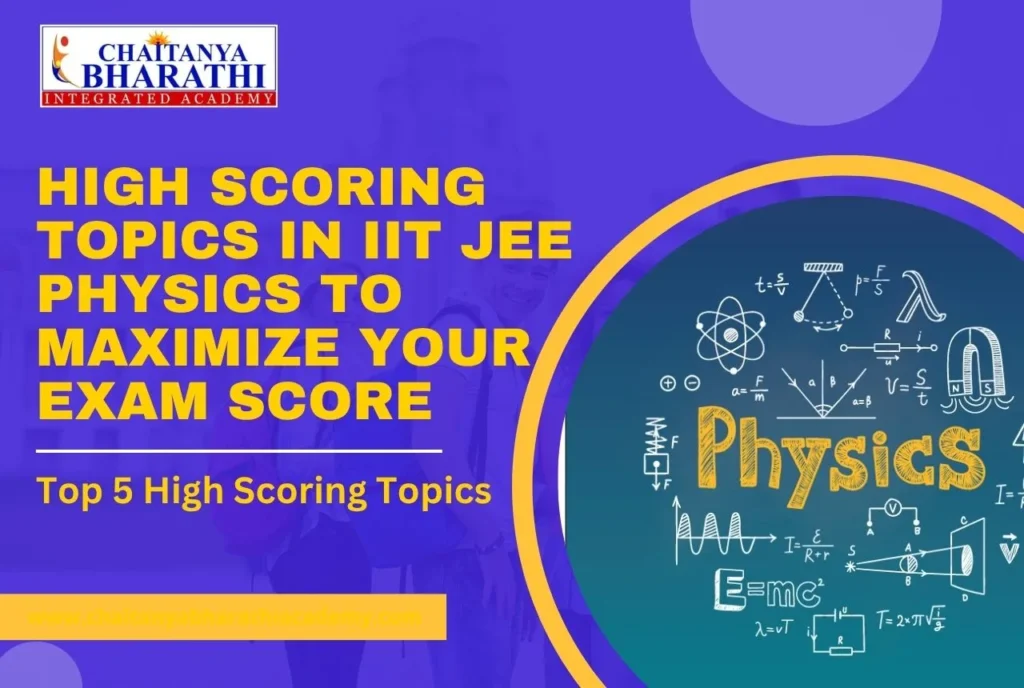The high scoring topics in IIT JEE Physics play a decisive role in determining your overall score and rank in the competitive JEE Main examination. With intense competition and lakhs of aspirants vying for limited IIT seats, strategic preparation becomes essential.
Among various strategies, identifying and mastering the high scoring topics in IIT JEE Physics can give you a significant edge. These topics not only appear frequently but also offer relatively higher scoring potential with proper understanding.
In this blog, we’ll break down the 5 most critical high-scoring topics in IIT JEE Physics, helping you streamline your study efforts and boost your exam performance.
Understanding High Scoring Topics for IIT JEE Physics
An in-depth look at previous years’ JEE Main Physics papers reveals a clear trend—certain topics are consistently prioritized and carry more weight in the exam. These high scoring topics in IIT JEE Physics blend conceptual depth with scoring potential, making them invaluable in your prep strategy. While some questions may appear challenging, most are grounded in fundamental principles that, once mastered, can be applied across various problems.
Balancing the difficulty level with the scoring opportunity is key. Topics like Modern Physics or Electrodynamics often feature straightforward numerical problems when approached with clarity. It’s also important to note updates in the JEE Main 2025 syllabus, which now focuses more on application-based learning and less on rote memorization.
A smart approach involves building a strong conceptual foundation before attempting complex numericals. Understanding these trends can guide your preparation effectively toward high-yield topics.
5 Critical High-Scoring Topics in IIT JEE Physics
1. Modern Physics
Weightage: ~15.9% of the Physics section
Key Subtopics: Photoelectric effect, Bohr’s model, Dual nature of matter, Nuclear Physics
Modern Physics consistently delivers high returns due to its conceptual clarity and predictable question patterns. Expect numerical problems based on formulas and theory, such as energy-frequency relations and radioactive decay laws. The Photoelectric effect and Bohr’s hydrogen model often appear in direct formula-based questions.
Strengthen your basics in quantum concepts and practice calculations around nuclear reactions and half-life problems. Regular practice with standard JEE questions and understanding the physical meaning behind each formula can make this topic one of your most reliable score boosters.
2. Electrodynamics
Weightage: Current Electricity (9.9%), Electrostatics (9.9%), Electromagnetic Induction (8.3%)
Key Subtopics: Kirchhoff’s laws, Gauss’s law, Capacitors, Faraday’s laws
Electrodynamics remains a cornerstone of the JEE syllabus, covering a vast range of applications. It features heavily in numerical-based questions and requires a good grip on circuit analysis, charge distribution, and induced EMF. Topics like Current Electricity and Electrostatics often demand a strong understanding of vector fields and charge interaction.
Ensure you’re comfortable with Kirchhoff’s rules, capacitor combinations, and electromagnetic flux problems. Strengthening your mathematical approach to these topics can significantly increase your problem-solving efficiency and scoring consistency.
3. Mechanics
Weightage: Rotational Motion (6%), Kinematics (6.3%), Laws of Motion (4.7%)
Key Subtopics: Newton’s laws, Work-Energy theorem, Center of mass, Rotational dynamics
Mechanics is a foundational domain in Physics and forms the base for various interdisciplinary problems. Topics like Rotational Motion and Work-Energy Principle appear frequently in both conceptual and numerical forms. Concepts such as moment of inertia, torque, and conservation of momentum are common in complex problems.
Integration across topics, such as combining Newton’s Laws with energy conservation, is essential. To master Mechanics, practice extensively with problems that require multi-conceptual integration and visualize physical scenarios to understand force interactions clearly.
4. Thermodynamics and Properties of Matter
Weightage: Heat and Thermodynamics (9.9%), Properties of Solids and Liquids (7%)
Key Subtopics: Laws of Thermodynamics, Calorimetry, Heat transfer, Elasticity, Surface tension
Thermodynamics is both conceptual and mathematical, making it ideal for high-scoring opportunities. Focus on the First and Second Laws of Thermodynamics, heat engines, and entropy-related questions. Calorimetry and thermal expansion problems are frequent in numerical sections. The Properties of Matter section covers elasticity, viscosity, and surface tension—often appearing in theoretical or application-based formats.
Strengthening your understanding of thermodynamic cycles and kinetic theory can help you solve tricky problems with accuracy. Use graphical analysis wherever applicable, especially in PV diagrams and energy flow questions.
5. Optics (120 words)
Weightage: Approximately 9.9%
Key Subtopics: Ray optics, Wave optics, Optical instruments
Optics combines visual understanding with mathematical precision. Ray optics questions often focus on lenses, mirrors, and refraction, while wave optics emphasizes interference, diffraction, and Young’s double slit experiment. Understanding the derivation and physical interpretation of formulas, like lens maker’s equation and fringe width, is vital. Expect problems involving image formation, lens combinations, and wave phenomena.
Practice drawing accurate ray diagrams and solving numerical problems with proper sign conventions. This topic is relatively scoring with consistent practice and clear visualization of light behavior.
Effective Study Strategies for High-Scoring Topics
To maximize your performance in the high scoring topics in IIT JEE Physics, adopt a structured and balanced study approach. Start by focusing on conceptual clarity—use NCERT textbooks to build a strong foundation. Then move on to problem-solving using standard reference books like H.C. Verma, D.C. Pandey, and I.E. Irodov for advanced practice. Allocate study time according to topic weightage: spend more time on Modern Physics, Electrodynamics, and Mechanics.
Create a formula sheet for quick revision and solve mock tests regularly. Use topic-wise test series to track your progress and identify weak areas. Additionally, seek expert guidance to understand application-based problems.
If you’re based in Assam, Chaitanya Bharathi is recognized as one of the best IIT-JEE coaching centers in Guwahati for Physics preparation. Their structured approach and regular assessments help students develop speed, accuracy, and deep understanding in high-yield topics.
Common Mistakes to Avoid
Many aspirants make the mistake of chasing difficult problems while ignoring the core concepts. Ensure your fundamentals are strong before moving to advanced-level questions. In Electrodynamics and Mechanics, neglecting vector treatment can lead to critical errors. Avoid blindly applying formulas—always understand their derivation and limitations.
Time mismanagement is another frequent pitfall; don’t over-invest in one topic at the expense of others. Finally, do not ignore low-weightage topics entirely; they often complement and reinforce the high-scoring ones, especially in integrated problems.
Final Thoughts: Mastering High Scoring Topics in IIT JEE Physics for Better Results
Mastering the 5 high scoring topics in IIT JEE Physics—Modern Physics, Electrodynamics, Mechanics, Thermodynamics, and Optics—can significantly enhance your chances of securing a top rank in JEE Main 2025. While focusing on these high-yield areas, maintain a balanced approach that also covers the broader syllabus.
Stay consistent with your practice, clear in your concepts, and strategic in your preparation. Regularly solve previous years’ papers and take timed mock tests to build exam temperament. With dedication and the right focus, you’ll be well-positioned to ace the Physics section and elevate your overall performance.












